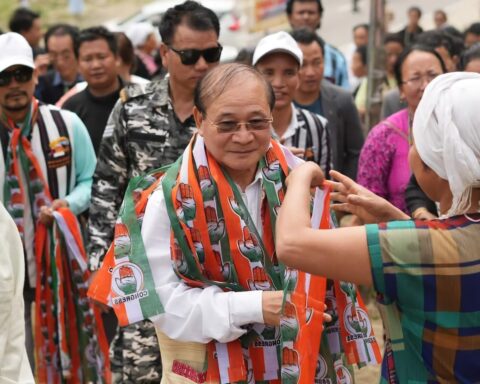Tawang: In a significant development aimed at enhancing healthcare services in the state, Chief Minister Pema Khandu on Tuesday inaugurated the Chief Minister Health Emergency Life Protection Service (CM HELPS) at the Khando Drowa Sangmo District Hospital here on Tuesday.
The CM HELPS center is the second of its kind after the Tomo Riba Institute of Health & Medical Sciences (TRIHMS) in Naharlagun, and it is specifically designed to cater to the healthcare needs of individuals residing in remote and challenging terrains.
Khandu, in his speech during the event, highlighted that this customized, affordable, accessible, and high-quality emergency care facility would significantly benefit patients by providing them with ease of medical services.
Arunachal Pradesh, characterized by its remote and scattered population, faces the challenge of addressing health emergencies in areas with rugged and difficult terrains. Such emergencies often strike when patients and their families are mentally, physically, and financially vulnerable, leaving them ill-prepared to cope with the situation, the chief minister said.
He further stressed the need for affordable, accessible, context-specific, and high-quality emergency care, and the establishment of the CM HELPS initiative is a step in the right direction to address these challenges.
Khandu also mentioned that the state government is actively upgrading and transforming the casualty rooms and emergency units of District Hospital Seppa, District Hospital Tawang, General Hospital Aalo, District Hospital Koloriang, and District Hospital Longding into modern Emergency Care Centers.
“These upgraded facilities are scheduled to be launched before the end of June. Additionally, the emergency/casualty units of all district hospitals in the state will be transformed in phases,” Khandu said.
The chief minister said to ensure efficient operations and streamlined workflows in emergency units, the health department has developed written Standard Operating Procedures, which provide a predefined framework for actions in dynamic emergency situations.
This framework facilitates better coordination and implementation of emergency care services across the state, representing a significant step forward in healthcare management, he said.
The chief minister also highlighted the readiness and functionality of the state-of-the-art Emergency and Trauma Centre at TRIHMS.
Equipped with a dedicated CT scan, modular operation theaters, and diagnostic services exclusively for emergency patients, this facility ensures critical care services are readily available. Moreover, all beds in this emergency block are designed to deliver critical care services.
Khandu further informed that the health department has taken various initiatives to strengthen the healthcare infrastructure. These include the provision of 26 Patient Transport Vehicles, 26 Mobile Medical Vehicles, and 26 Oxygen cum Vaccine Carriers (one for each district). Additionally, 27 PM CARES PSA plants have been installed across the state.
Addressing the critical need for oxygen supply, the chief minister stated that medical oxygen pipelines have been installed in all district hospitals, while oxygen concentrators and cylinders have been made available in all districts.
The state currently depends on neighboring Assam for refilling oxygen cylinders; however, the health department is actively working on establishing a state-of-the-art self-sufficient Atmanirbhar oxygen grid, he said.
In terms of critical care capabilities, the state has established 64 ICU beds. To further strengthen these capabilities, an additional 56 ICU beds, 33 Pediatric ICU beds, and 40 Pediatric High Dependency Unit (HDU) beds are being added. Furthermore, the recruitment of 90 nursing officers specialized in critical and emergency care is currently underway, the chief minister informed.
The chief minister also made announcements regarding the upcoming launch of a Cardiac Cath Lab at TRIHMS, which will significantly enhance the capability of the hospital to handle cardiac emergencies. The setting up of the National Emergency Life Support Skill Centre for imparting training on emergency care is under process at TRIHMS, he said.
The chief minister further announced that a 50-bed Critical Care Hospital has been approved for Pasighat while high-capacity diesel generator sets have been installed in 23 district hospitals. Further, emergency solar power back up has been established at 23 health facilities, he said.
“Our government has embarked upon a journey of providing critical care services. Present effort, though may be found less than ideal, will serve as a stepping stone in the road to affordable, accessible and quality emergency and critical care,” he said.
Among others, MLAs Tsering Lhamu and Tsering Tashi, Tawang DC K N Damo and SP B Kamduk were present on the occasion.
Also read: CM Khandu advocates nine parameters for sustainable village development





